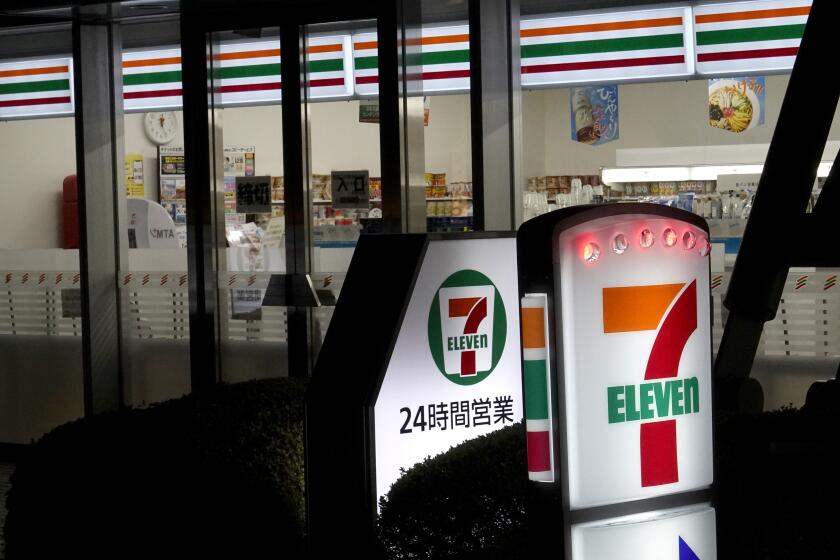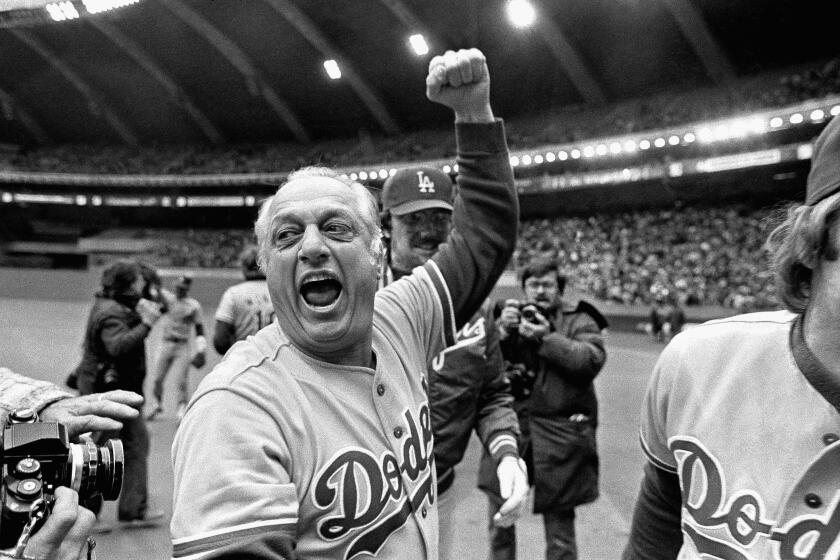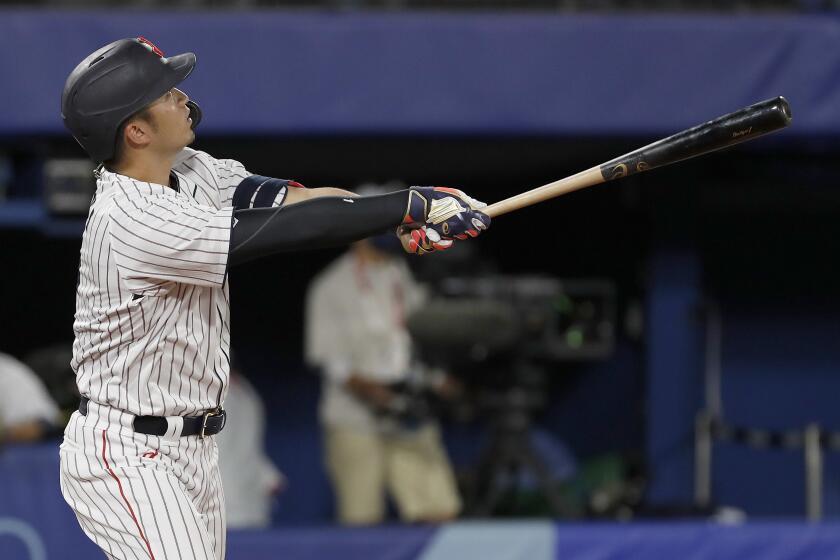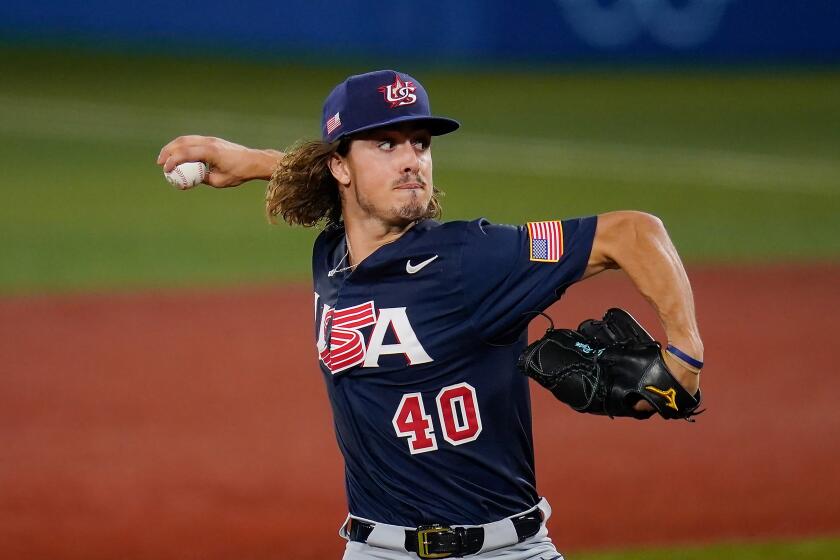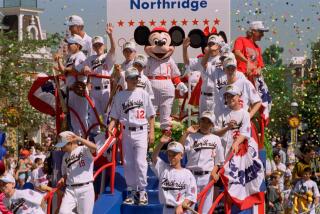U.S. baseball coach Mike Scioscia on Japan’s gold medal: ‘They deserved to win’
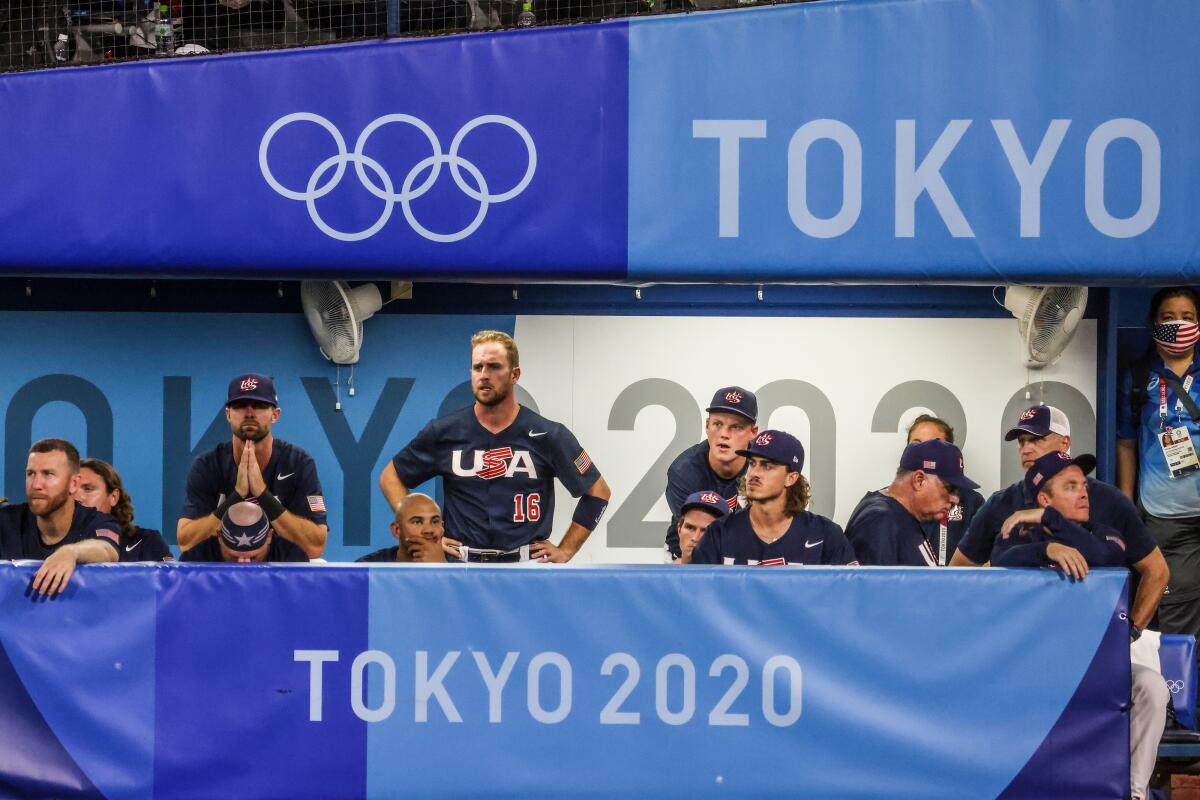
YOKOHAMA, Japan — Mike Scioscia led his group of players, probably the last group of his long baseball career, out to home plate for handshakes Saturday night.
The United States Olympic baseball team, freshly devastated, lined up behind him to meet Japan’s gold-medal-winning team. The Americans gritted their teeth, smiled and congratulated the Japanese. Then they walked off the field at Yokohama Stadium while their opponents punctuated their victory with a doh-age on the mound, tossing their manager in the air in celebration.
The U.S. was the only team to give Japan a scare in the Olympic baseball tournament, the only one to dent the host country’s armor. But for the second time in less than a week, this time for the gold medal, they couldn’t topple the Japanese, dropping the final 2-0.
The 7-Elevens in Japan are seemingly everywhere and offer a plethora of food options that aren’t available in the U.S. Why is everything so different?
“They deserved to win,” Scioscia said.
The Americans were seeking their first baseball gold since 2000. They settled for their first silver and their third medal in baseball since it became an official Olympic sport at the 1992 Games. Baseball was dropped from the Games in 2012 and 2016. They finished the tournament 4-2.
The result was a breakthrough for Japan. The baseball-fixated nation had never won gold, earning silver once and bronze twice. Earlier in the day, the Dominican Republic, another baseball power, claimed its first Olympic medal in the sport by beating South Korea 10-6.
For Scioscia, the loss was probably the end. The former Dodgers catcher and Angels manager repeated Saturday that he will not manage in the major leagues, perhaps at any level, again. He said he will stay connected to the sport in other ways through Team USA and Major League Baseball but in another capacity.
“I put my heart and soul into it and enough is enough,” Scioscia, 62, said. “So, I’m not going to manage again. The next step for me is to relax tomorrow. I’m going to get the coaching staff together and maybe have a beer.”
Scioscia took the job to manage the Americans in April, three months after Tommy Lasorda, his manager for his entire 13-year playing career, died.
It was Lasorda who implored Scioscia to take the opportunity to manage the U.S. team if ever presented to him. The Hall of Fame manager was in the dugout for the Americans in 2000 and insisted winning gold for his country was the most important accomplishment of his storied baseball life, eclipsing even his two World Series titles as Dodgers manager.
Scioscia listened to his old boss and accepted the offer. He managed the Americans from the qualifying tournament in June through Saturday, one step shy of matching Lasorda.
Japan played the role of favorite at these Games and slipped ahead Saturday in the third inning on third baseman Munetaka Murakami’s solo home run off U.S. starter Nick Martinez.
Otherwise, Martinez was sharp. The right-hander gave up the one run on five hits with seven strikeouts and one walk across six innings.
A look back at the life of legendary Dodgers manager Tommy Lasorda, who died on Jan. 7, 2021 at the age of 93.
Martinez, who plays for Japan’s Softback Hawks, encountered his biggest trouble in the fourth inning when Japan loaded the bases with one out. But he escaped, roaring as he strutted off the mound after striking out Ryosuke Kikuchi to squash the threat.
The Americans, however, couldn’t solve 24-year-old Masato Morishita or the four relievers that followed. Morishita, the 2020 rookie of the year in Japan’s Central League, held the U.S. to three hits over five innings.
The teams exchanged zeros until Japan doubled its lead in the eighth on two singles, a sacrifice bunt and a mistake. Tetsuto Yamada led off with a single off right-hander Scott McGough, advanced to second base on Hayato Sakamoto’s bunt and went to third on Masataka Yoshida’s single to center field.
Jack López fielded the hit on a high bounce off the artificial turf and, thinking Yamada would try to score, launched a throw home. But Yamada was held at third base as López’s throw sailed down the third base line. It bounced past catcher Mark Kolozsvary to the backstop, prompting Yamada to race home. McGough quickly gathered the ball and fired a sidearm throw to a retreating Kolozsvary, who couldn’t twist around and apply the tag on Yamada in time.
A look at Sieya Suzuki, the next best Japanese baseball player who might come to the U.S. These Olympics could propel him to the top.
“We knew they were going to come at us, and they got us today,” U.S. third baseman Todd Frazier said.
Japan was 5-0 in the tournament, handing the Americans their only two losses — the first in a 7-6, 10-inning thriller Monday.
The Japanese benefited from Nippon Professional Baseball — the country’s top league — pausing its season for the Olympics and letting players participate. The host country’s entry was essentially an All-Star team from the second-best league in the world.
The U.S. roster was a jumbled collection of players at various stages of their careers, with a broad spectrum of experience and aspirations, because Major League Baseball didn’t allow players on 40-man rosters to compete.
There were former established major leaguers in their mid-to-late 30s (Frazier, Edwin Jackson, Scott Kazmir and David Robertson). There were promising prospects still scratching the surface (Triston Casas, Nick Allen, Shane Baz, Joe Ryan and Simeon Woods-Richardson). There were older minor leaguers still trying to find their footing (López, Eric Filia and Jamie Westbrook).
Designated hitter Tyler Austin, starter Martinez and reliever McGough play in Japan. Right-hander Anthony Carter pitches in Mexico. Second baseman and leadoff hitter Eddy Alvarez was a silver medalist at the 2014 Winter Games who made his major league debut last year. He became the sixth person to ever medal in both the Winter and Summer Olympics.
U.S. pitchers Joe Ryan and Scott Kazmir are big fans of the baseballs being used in the Tokyo Olympics. Would MLB consider making a switch?
“I think it’s remarkable the way our team played, really under such different circumstances than they usually face back in the States in a normal season,” Scioscia said. “Every game was a Game 7.”
Ten of the 24 players didn’t play in the qualifying tournament. But the 24 had this in common: They’re all going to at least attempt to continue their careers after the Olympics. There’s more for them, and the goal remains the major leagues. That’s not the same for their manager.
Scioscia became one of the most successful managers since the turn of the century, posting a .536 winning percentage with six division titles and a World Series championship in 19 seasons leading the Angels.
On Saturday, in his final act at any helm, he watched the medal ceremony from in front of the U.S. dugout, on the first base side, with his coaching staff. He was still in full uniform, No. 54, applauding each time an American was announced and presented with his silver.
More to Read
Go beyond the scoreboard
Get the latest on L.A.'s teams in the daily Sports Report newsletter.
You may occasionally receive promotional content from the Los Angeles Times.

